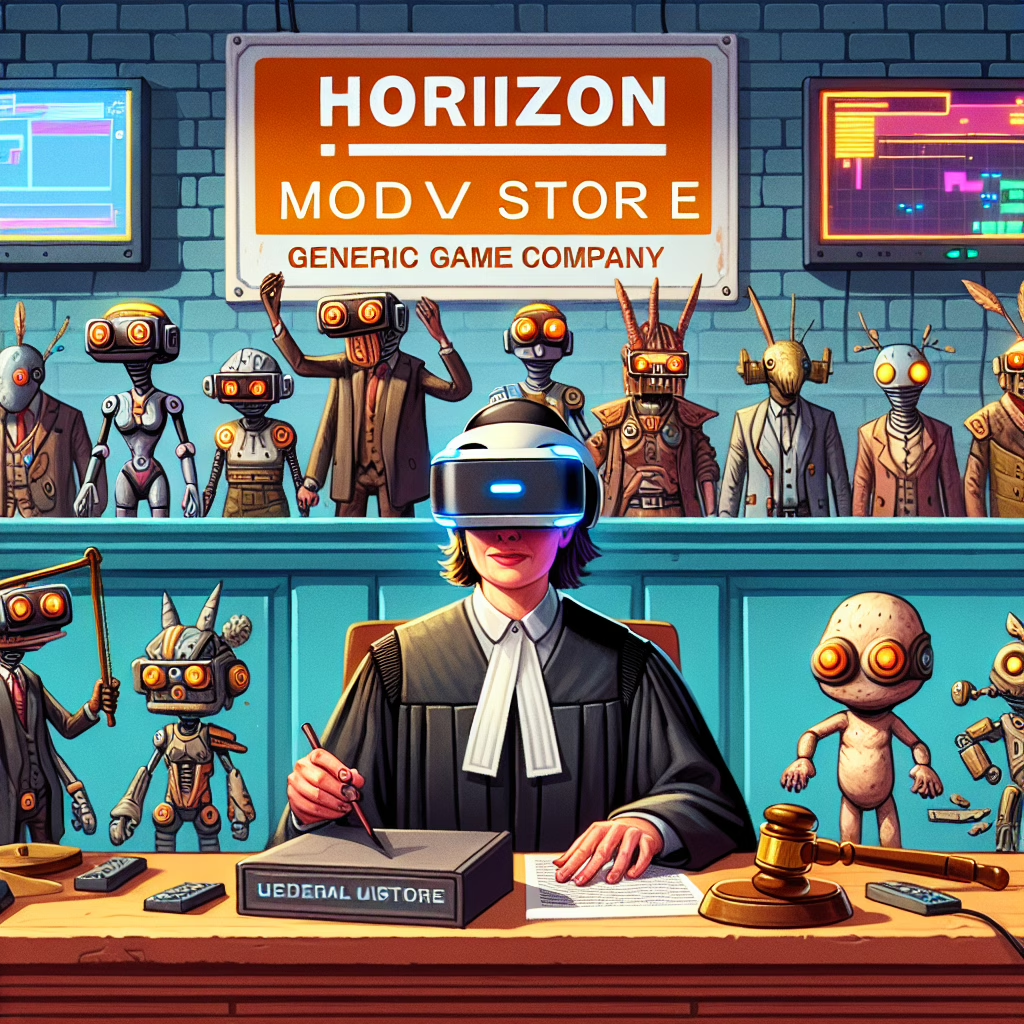In a world where video game lawsuits seem to pop up like mushrooms after rain, Sony is once again in the spotlight. This time, it’s all about their beloved franchise, Horizon, and a rather spirited legal tussle over the Motiram Dev Store. Buckle up, dear readers, as we delve into this captivating tale of pixels, profits, and legalese.
The Legal Landscape: A Gaming Odyssey
First off, let’s talk about what exactly is happening here. Sony has been riding high on the success of its Horizon series, but it seems that not everyone is quite as thrilled about it. The lawsuit involves claims that the Motiram Dev Store is infringing on some of Sony’s prized intellectual property. Now, if you thought gaming was just about fun and adventure, think again! It also comes with a hefty dose of courtroom drama.
To make things even more intriguing, this lawsuit isn’t just a simple case of “Hey, that’s my game!” It dives deep into the murky waters of copyright law and intellectual property rights—two subjects that can make even the most seasoned gamer’s head spin faster than a speedrun attempt at any game.
In a market where innovation is king and competition is fierce, the stakes are high. With the popularity of titles like Horizon, legal battles can have far-reaching consequences, not only for the companies involved but also for gamers and developers alike.
What Is the Motiram Dev Store?
You might be wondering, “What exactly is the Motiram Dev Store?” Picture this: it’s like your local farmer’s market but for video games—an eclectic mix where indie developers showcase their masterpieces alongside bigger titles. While it sounds charming, it’s also a potential hotbed for copyright clashes. In this case, Sony claims that certain elements in games featured on the store bear an uncanny resemblance to its iconic Horizon series. But hey, imitation is the sincerest form of flattery, right?
However, when it comes to intellectual property rights in gaming, things can get a bit dicey. The line between inspiration and infringement is as thin as a character in a platformer who just missed a jump. Sony isn’t shy about defending its treasure trove of franchises—because who wouldn’t want to protect their golden goose?
The Motiram Dev Store provides a platform for innovation but also raises questions about the boundaries of creativity in gaming. As a result, this lawsuit could influence how indie developers approach their projects in the future, impacting the diversity and richness of the gaming experience.
The Impact on Developers
Now, let’s take a moment to consider the little guys—the indie developers. While big names like Sony have the resources to battle it out in court (and let’s be honest, they can probably afford to hire an army of lawyers), smaller studios often find themselves caught in the crossfire.
This situation creates an interesting dynamic in the gaming industry. Indie developers might feel like they’re walking through a legal minefield every time they design their next big hit. The fear of being slapped with a lawsuit can stifle creativity faster than a laggy server during peak hours. This legal tug-of-war may lead to fewer innovative ideas making it to market if developers feel they have to play it safe.
- Indie developers may seek to create original titles to avoid legal disputes.
- Smaller studios might collaborate with legal experts to navigate the complexities of copyright law.
- Increased awareness of intellectual property rights could lead to a more cautious approach to game development.
Learning from Legal Battles
So what can we learn from this ongoing saga? For starters, it’s clear that understanding intellectual property rights is essential for anyone looking to make waves in the gaming industry—whether you’re an indie developer or part of a massive corporation like Sony.
Moreover, this case shines a light on how important it is for platforms like the Motiram Dev Store to foster an environment where creativity can flourish without fear. After all, innovation drives gaming forward! And let’s face it; no one wants to see another generic sequel flooding the market.
This legal situation could push for clearer guidelines and better practices around copyright laws in gaming, potentially benefitting all developers. As they navigate this evolving landscape, the emphasis on originality and respect for intellectual property will be crucial.
A Silver Lining?
Despite the serious nature of this lawsuit, there’s always room for humor—even amid courtroom chaos! Imagine a judge trying to determine whether or not a character looks too much like Aloy from Horizon Zero Dawn while wearing VR goggles and munching on popcorn. Now that’s a courtroom I’d pay to see!
In all seriousness, these legal proceedings could potentially lead to clearer guidelines around copyright laws in gaming—a win for everyone involved! If nothing else, let’s hope this brings about some clarity and helps support those brave indie developers trying to carve out their space in this vibrant industry.
Conclusion: Your Thoughts?
This saga showcases how intertwined creativity and law can be in today’s gaming landscape. While big companies battle it out over intellectual property rights, let’s keep our fingers crossed that innovation continues to thrive without too many legal hiccups along the way.
What do you think about this whole situation? Are you rooting for Sony, or do you sympathize with indie developers? Share your thoughts below!
For further insights, consider reading about anticipated indie games and their influence on the gaming industry or explore how developers respond to server issues in popular titles.
Stay tuned for updates on this ongoing story as it unfolds!

